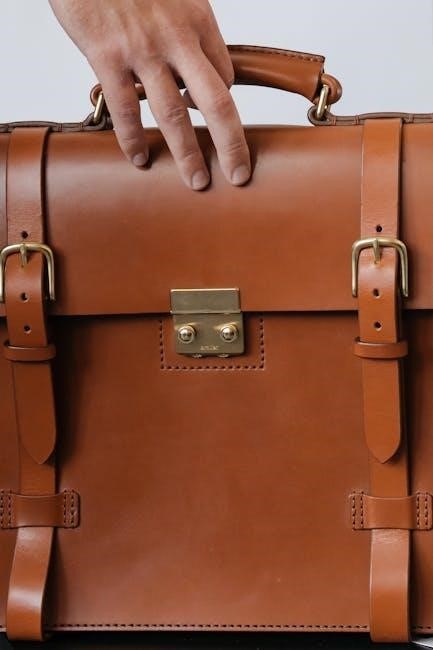The Brief COPE is a self-report inventory assessing coping strategies. It is widely used to evaluate how individuals manage stress. A French version exists for cross-cultural applications.
1.1 Overview of the Brief COPE Inventory
The Brief COPE inventory is a 28-item self-report questionnaire designed to assess coping strategies in response to stressful situations. It evaluates both adaptive and maladaptive strategies‚ providing insights into how individuals manage stress. The inventory is structured into 14 subscales‚ each representing a specific coping strategy‚ such as active coping‚ denial‚ and emotional support seeking. The French version of the Brief COPE has been validated to ensure cross-cultural applicability‚ making it a valuable tool for research and clinical settings. Its concise format allows for efficient data collection while maintaining robust psychometric properties.
1.2 Importance of Coping Strategies in Stress Management
Coping strategies play a crucial role in managing stress‚ influencing both emotional and psychological well-being. Effective strategies‚ such as problem-focused coping‚ enhance resilience and reduce stress outcomes. Conversely‚ maladaptive strategies‚ like avoidance‚ can exacerbate distress. Assessing these strategies through tools like the Brief COPE helps identify individuals’ strengths and vulnerabilities. Understanding coping mechanisms is essential for developing interventions and promoting mental health. The French version of the Brief COPE facilitates this assessment across linguistic and cultural boundaries‚ ensuring diverse populations can benefit from tailored stress management approaches.
1.3 Purpose of the French Version of the Brief COPE
The French version of the Brief COPE was developed to extend its accessibility to Francophone populations. This translation ensures cultural adaptability‚ making the tool applicable in diverse linguistic and cultural contexts. It maintains the original structure‚ assessing 14 coping dimensions through a 28-item inventory. The primary goal is to provide a reliable measure for understanding how French-speaking individuals manage stress. This adaptation supports cross-cultural research and clinical applications‚ ensuring consistent evaluation of coping strategies across different populations. The French version upholds the instrument’s validity and reliability‚ making it a valuable resource for both research and practical interventions.
Development and Validation of the Brief COPE
The Brief COPE was developed by Carver in 1997 and validated across cultures. The French version was adapted by Baumstarck et al. (2017) and Muller & Spitz (2003)‚ ensuring its reliability and cultural relevance for Francophone populations.
2.1 Initial Development of the Brief COPE
The Brief COPE was originally developed by Charles Carver in 1997. It was designed as a concise alternative to the longer COPE inventory‚ focusing on assessing 14 distinct coping dimensions. The 28-item questionnaire uses a Likert scale to measure both adaptive and maladaptive strategies‚ providing a clear framework for understanding individual responses to stress. Its development aimed to offer a practical tool for researchers and clinicians to evaluate coping mechanisms efficiently. The original version has since been translated and validated in multiple languages‚ including French‚ to broaden its cross-cultural application and relevance.
2.2 French Translation and Validation Process
The French translation of the Brief COPE involved rigorous linguistic adaptation to ensure cultural equivalence. Researchers translated the 28 items and conducted validation studies to maintain the original instrument’s psychometric properties. The process included back-translation and testing with French-speaking participants to verify reliability and validity. Studies by Baumstarck et al. (2017) and Muller and Spitz (2003) confirmed the French version’s effectiveness in assessing coping strategies. This adaptation ensures the questionnaire can be accurately used in French-speaking populations‚ enhancing its cross-cultural applicability for research and clinical purposes.
2.3 Cross-Cultural Validation of the Questionnaire
The French version of the Brief COPE underwent cross-cultural validation to ensure its effectiveness across diverse populations. Studies compared the French version with the original English one‚ confirming consistency in measuring coping strategies. Research highlighted that both versions reliably assess adaptive and maladaptive strategies. This validation allows the questionnaire to be used internationally‚ facilitating comparative studies on stress management behaviors. The cross-cultural validation ensures that the Brief COPE remains a valuable tool for understanding coping mechanisms in varied cultural contexts‚ enhancing its global applicability in both clinical and research settings.

Structure of the Brief COPE Questionnaire
The Brief COPE is a self-report inventory designed to evaluate various coping strategies. It is structured to assess both adaptive and maladaptive approaches to stress management effectively.
3.1 Overview of the 28-Item Inventory
The Brief COPE questionnaire is a 28-item inventory designed to assess coping strategies. It is divided into 14 subscales‚ each containing two items‚ measuring both adaptive and maladaptive coping mechanisms. The French version‚ validated by Muller and Spitz (2003)‚ maintains the original structure to ensure cross-cultural reliability. Each item is rated on a 4-point Likert scale‚ allowing respondents to indicate the frequency of their coping behaviors. This format ensures a comprehensive evaluation of how individuals manage stress‚ providing insights into their emotional‚ cognitive‚ and behavioral responses to challenging situations.
3.2 Dimensions of Coping Strategies Assessed
The Brief COPE evaluates 14 distinct coping dimensions‚ categorizing them into adaptive and maladaptive strategies. Adaptive strategies include active coping‚ planning‚ and seeking social support‚ while maladaptive strategies involve denial‚ substance abuse‚ and behavioral disengagement. The French version retains these dimensions‚ ensuring cross-cultural applicability. Each dimension is measured with two items‚ providing a nuanced understanding of how individuals manage stress. This structure allows for a comprehensive assessment of coping behaviors‚ highlighting both effective and ineffective strategies. The questionnaire’s design ensures a balanced evaluation of emotional‚ cognitive‚ and behavioral responses to stressful situations.
3.3 Likert Scale Format for Respondent Feedback
The Brief COPE employs a 4-point Likert scale for respondent feedback‚ enabling nuanced responses. Participants rate their coping strategies from 1 (“I haven’t done this at all”) to 4 (“I’ve done this a lot”). This format allows for precise measurement of the frequency and intensity of coping behaviors. The scale is consistent across all 28 items‚ ensuring reliability and validity in assessing both adaptive and maladaptive strategies. The French version retains this structure‚ facilitating cross-cultural comparisons. This scaling method provides a clear framework for understanding individual differences in coping mechanisms‚ aiding researchers and clinicians in interpreting responses effectively.

Coping Strategies Assessed by the Brief COPE
The Brief COPE evaluates 14 dimensions of coping strategies‚ distinguishing between adaptive and maladaptive approaches. The French version maintains this structure‚ ensuring cross-cultural consistency in stress management assessment.
4.1 Adaptive Coping Strategies
Adaptive coping strategies are effective methods individuals use to manage stress positively. The Brief COPE identifies these strategies‚ such as planning‚ positive reframing‚ and seeking social support. These approaches help individuals maintain emotional balance and problem-solving capacity. The French version of the questionnaire retains these dimensions‚ ensuring cross-cultural relevance. Adaptive strategies focus on proactive behaviors and cognitive restructuring‚ fostering resilience. They are contrasted with maladaptive strategies‚ emphasizing their constructive role in stress management. Understanding these strategies is crucial for developing interventions that promote mental health and well-being.
4.2 Maladaptive Coping Strategies
Maladaptive coping strategies are ineffective and harmful approaches to dealing with stress. The Brief COPE assesses these strategies‚ including denial‚ substance use‚ and behavioral disengagement. These methods often exacerbate stress and hinder problem-solving. The French version of the questionnaire evaluates these strategies‚ highlighting their negative impact. Maladaptive strategies can lead to emotional distress and poorer outcomes. They are contrasted with adaptive strategies‚ emphasizing the need to address these behaviors in interventions. Recognizing maladaptive coping is essential for developing targeted support to improve mental health and resilience.
4.3 Comparison of Effective and Ineffective Strategies
The Brief COPE differentiates between adaptive and maladaptive strategies. Adaptive strategies‚ like planning and seeking support‚ foster resilience and problem-solving. In contrast‚ maladaptive strategies‚ such as denial or substance use‚ worsen stress. The French version highlights this distinction‚ aiding in understanding coping mechanisms. By comparing these strategies‚ the questionnaire helps identify individuals at risk and informs interventions. This comparison is vital for tailoring support and promoting healthier coping behaviors‚ ultimately enhancing mental health outcomes and stress management.
Administration and Interpretation Guidelines
The Brief COPE is self-administered‚ using a Likert scale. Responses are scored to identify coping strategies‚ aiding in clinical assessments and interventions. French validation ensures cross-cultural applicability.
5.1 Instructions for Completing the Questionnaire
The Brief COPE is designed for self-administration‚ requiring participants to rate their coping strategies on a 4-point Likert scale. Respondents are instructed to answer honestly‚ reflecting their typical responses to stress. The questionnaire is concise‚ ensuring ease of completion within 10 minutes. Clear instructions are provided in French to accommodate cross-cultural use. Participants are encouraged to avoid skipping items and to select responses that best align with their behaviors. The goal is to ensure accurate and reliable data for clinical or research purposes‚ aiding in stress management and intervention strategies.
5.2 Scoring and Interpretation of Results
The Brief COPE scoring involves summing responses across 14 subscales‚ each representing a coping strategy. Items are rated on a 4-point Likert scale‚ ranging from “not at all” to “very often.” Adaptive strategies (e.g.‚ active coping) are typically summed separately from maladaptive ones (e.g.‚ substance use). Higher scores indicate greater use of specific strategies. Interpretation focuses on identifying dominant coping styles‚ distinguishing adaptive from maladaptive patterns. The French version maintains this structure‚ enabling cross-cultural comparisons. Results guide interventions by highlighting areas for improvement‚ such as reducing avoidance or enhancing problem-focused coping. This framework supports personalized feedback in clinical and research settings.
5.4 Clinical Applications of the Brief COPE
The Brief COPE is a valuable tool in clinical settings for identifying maladaptive coping strategies. It aids in diagnosing stress-related disorders and monitoring therapeutic progress. The French version enhances accessibility for Francophone populations. Clinicians use the inventory to tailor interventions‚ such as cognitive-behavioral therapy‚ by targeting ineffective coping mechanisms. It also supports stress management programs by fostering adaptive strategies like problem-focused coping. The questionnaire’s brevity and ease of administration make it practical for routine assessments. Its insights help improve mental health outcomes by addressing specific coping behaviors‚ ensuring personalized and culturally sensitive care for diverse patient groups.
Psychological Theoretical Framework
The Brief COPE is rooted in Lazarus and Folkman’s transactional model of stress‚ emphasizing appraisal and coping strategies. It aligns with theories of emotional regulation and adaptation.
6.1 Theoretical Basis of the Brief COPE
The Brief COPE is grounded in the transactional model of stress‚ developed by Lazarus and Folkman. This model posits that stress arises from the interaction between individuals and their environment‚ with coping strategies mediating the relationship. The questionnaire assesses both problem-focused and emotion-focused coping‚ reflecting the theoretical framework that individuals employ diverse strategies to manage stress. The French version maintains this theoretical foundation‚ ensuring cross-cultural applicability while preserving the core concepts of stress appraisal and coping mechanisms.
6.2 Relationship Between Coping and Stress Outcomes
The Brief COPE questionnaire emphasizes the link between coping strategies and stress outcomes. Adaptive strategies‚ such as problem-focused coping‚ often lead to better emotional and psychological well-being. Conversely‚ maladaptive strategies‚ like avoidance or substance use‚ can exacerbate stress and negatively impact mental health. The French version of the questionnaire retains this theoretical underpinning‚ allowing for cross-cultural validation of how different coping mechanisms influence stress outcomes. Understanding this relationship is crucial for developing interventions tailored to enhance adaptive coping and reduce maladaptive behaviors.
6.3 Integration with Other Psychological Assessments
The Brief COPE questionnaire is often integrated with other psychological assessments to provide a comprehensive understanding of mental health. For instance‚ it is frequently used alongside tools like the General Health Questionnaire (GHQ-12) and the Perceived Stress Scale (PSS). This integration allows researchers and clinicians to examine how coping strategies interact with overall stress levels‚ emotional well-being‚ and other psychological constructs. The French version of the Brief COPE has been validated for use in multi-assessment batteries‚ making it a versatile tool for both clinical and research applications aimed at understanding stress management and mental health outcomes.

Empirical Support and Reliability
The French version of the Brief COPE has demonstrated strong reliability and validity‚ supported by studies validating its cross-cultural adaptability and effectiveness in stress research.
7.1 Reliability and Validity of the French Version
The French version of the Brief COPE questionnaire has been validated through rigorous studies‚ ensuring its reliability and cultural adaptability. Research by Baumstarck et al. (2017) and Muller & Spitz (2003) confirmed its consistency with the original English version. The French adaptation maintains the 28-item structure and Likert scale format‚ ensuring cross-cultural comparability. Internal consistency scores for the French version are robust‚ with reliability coefficients often exceeding 0.70. This validation underscores the instrument’s effectiveness in assessing coping strategies within French-speaking populations‚ making it a valuable tool for cross-cultural stress research and clinical applications.
7.2 Cross-Validation with Other Coping Inventories
The French Brief COPE has been cross-validated with other established coping measures‚ such as the Coping Inventory for Stressful Situations (CISS). Studies demonstrate strong correlations between the French Brief COPE and the CISS subscales‚ confirming its convergent validity. Additionally‚ comparisons with the Perceived Stress Scale (PSS) and the General Health Questionnaire (GHQ-12) highlight its ability to assess stress outcomes effectively. These cross-validations reinforce the French version’s reliability and compatibility with international psychological assessments‚ ensuring its utility in diverse research contexts. This alignment with other validated tools underscores its value for comprehensive coping strategy evaluation.
7.3 Research Supporting the Use of the Brief COPE
Empirical studies consistently support the Brief COPE as a reliable tool for assessing coping strategies. Research highlights its effectiveness in evaluating both adaptive and maladaptive approaches to stress. The French version has been validated across diverse populations‚ demonstrating strong psychometric properties. Studies by Baumstarck et al. (2017) and others confirm its reliability in cross-cultural contexts. Its brevity and comprehensiveness make it a preferred choice in clinical and research settings. The Brief COPE has been instrumental in understanding stress management strategies‚ further solidifying its role in psychological assessments and interventions. This robust evidence base ensures its continued use in stress-related research and practice.

Applications in Clinical and Research Settings
The Brief COPE is widely used in clinical settings to assess stress management strategies. Its French version enhances accessibility for French-speaking populations in research and mental health assessments.
8.1 Use in Stress Management Programs
The French version of the Brief COPE questionnaire is widely utilized in stress management programs to assess individual coping strategies. Its concise format allows clinicians to identify adaptive and maladaptive behaviors‚ enabling personalized interventions. The tool is particularly valuable in cross-cultural settings‚ ensuring accessibility for French-speaking populations. By evaluating how individuals respond to stress‚ it aids in developing targeted interventions to enhance resilience and improve mental health outcomes. This makes it a practical resource for both clinical practice and research in stress management.
8.2 Application in Mental Health Assessments
The French version of the Brief COPE questionnaire is a valuable tool in mental health assessments. It helps professionals understand how individuals cope with stress‚ identifying both adaptive and maladaptive strategies. This insight is crucial for diagnosing mental health issues and monitoring treatment progress. The questionnaire’s brevity and cultural adaptability make it accessible for diverse populations. By assessing coping mechanisms‚ it enables tailored interventions‚ improving overall mental health outcomes; Its integration into clinical practice supports comprehensive patient care and enhances the effectiveness of therapeutic approaches.
8.3 Role in Coping Research and Studies
The French version of the Brief COPE questionnaire plays a significant role in coping research‚ enabling cross-cultural studies on stress management strategies. Its 28-item structure allows researchers to explore diverse coping mechanisms across different populations. The questionnaire’s reliability and validity make it a robust tool for investigating how individuals adapt to stress. By assessing both adaptive and maladaptive strategies‚ it contributes to understanding the psychological processes underlying stress responses. This tool is widely used in longitudinal studies to track changes in coping behaviors over time‚ providing valuable insights for developing interventions.

Limitations and Criticisms
The Brief COPE questionnaire faces criticism for potential cultural biases in its French version and its reliance on self-reported data‚ which may not fully capture coping complexity.
9.1 Potential Limitations of the Brief COPE
The Brief COPE has several limitations‚ including its reliance on self-reporting‚ which may lead to biases. Additionally‚ the 28-item structure might oversimplify complex coping mechanisms. The French version‚ while validated‚ may not fully capture cultural nuances‚ potentially affecting cross-cultural comparisons. Furthermore‚ the questionnaire’s focus on dispositional coping strategies might overlook situational variations in stress management. These limitations suggest the need for complementary assessments to ensure comprehensive understanding of coping behaviors.
9.2 Criticisms of the French Version
The French version of the Brief COPE has faced criticism for potential translation challenges‚ as nuances in coping strategies may not fully align with the original English version. Some researchers argue that cultural differences in stress management might not be adequately captured‚ leading to biased results. Additionally‚ the reliance on self-reporting in both versions may introduce subjective biases. While validated‚ comparisons with other inventories like the CISS suggest the French Brief COPE might lack depth in assessing certain coping dimensions‚ potentially limiting its cross-cultural applicability.
9.3 Comparisons with Other Coping Inventories
The French Brief COPE is often compared to other inventories like the CISS‚ which offers a broader assessment of coping strategies. While the Brief COPE is concise‚ its brevity may limit depth. Studies suggest it aligns well with the GHQ-12 and Perceived Stress Scale‚ enhancing its validity. However‚ its 14 dimensions are less detailed than some longer inventories‚ potentially reducing sensitivity to nuanced coping mechanisms. Despite this‚ the French version remains a valuable tool for cross-cultural research‚ though researchers often recommend combining it with other assessments for comprehensive insights.
The French version of the Brief COPE is a reliable tool for assessing coping strategies. It enhances cross-cultural research and clinical applications‚ proving valuable despite some limitations in depth.
10.1 Summary of the Brief COPE Questionnaire
The Brief COPE is a 28-item self-report questionnaire assessing coping strategies. It evaluates both adaptive and maladaptive approaches to stress. The French version‚ validated for cross-cultural use‚ provides reliable data on how individuals manage stressors. Widely used in research and clinical settings‚ it offers insights into effective and ineffective coping mechanisms. Its brevity and Likert-scale format enhance accessibility. The questionnaire is particularly valuable for understanding stress management across diverse populations‚ making it a versatile tool in psychology and mental health assessments. Its applications span clinical interventions‚ research studies‚ and cross-cultural comparisons‚ solidifying its importance in the field of coping strategies.
10.2 Future Directions for the French Version
Future directions for the French Brief COPE include enhancing its cross-cultural validity. Expanding its use in diverse populations will improve stress management research. Integrating digital platforms for easier administration is another goal‚ ensuring broader accessibility. Further studies are needed to explore its applicability in various clinical contexts. Additionally‚ refining the questionnaire to address emerging stressors will keep it relevant. Collaboration with international researchers could enhance its adaptability. These advancements will strengthen the French version’s role in global psychological assessments and stress management interventions. By addressing these areas‚ the Brief COPE will remain a valuable tool for understanding coping strategies across cultures.
